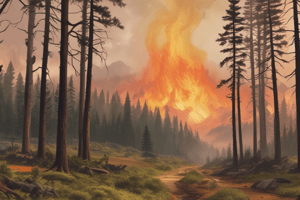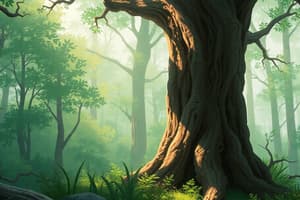Podcast
Questions and Answers
What is the environmental impact of forest clear-cutting?
What is the environmental impact of forest clear-cutting?
Increased runoff and nutrient loss.
What are the four features of the scientific process?
What are the four features of the scientific process?
- Peer review (correct)
- Curiosity (correct)
- Skepticism (correct)
- Reproducibility (correct)
What are the steps involved in the scientific process?
What are the steps involved in the scientific process?
- Formulate a hypothesis (correct)
- Identify problem/question (correct)
- Create a theory
- Analyze data (correct)
The goals of science include developing scientific theories and laws.
The goals of science include developing scientific theories and laws.
What does reliable science refer to?
What does reliable science refer to?
The natural greenhouse effect helps keep _____ temperatures moderate.
The natural greenhouse effect helps keep _____ temperatures moderate.
According to the 2007 IPCC report, what was the very likely increase in temperature from 1906 to 2005?
According to the 2007 IPCC report, what was the very likely increase in temperature from 1906 to 2005?
What is the main cause of global warming according to the 2007 IPCC report?
What is the main cause of global warming according to the 2007 IPCC report?
Scientific laws represent a _____-accepted pattern in data.
Scientific laws represent a _____-accepted pattern in data.
Flashcards are hidden until you start studying
Study Notes
Hubbard Brook Experimental Forest
- Investigates environmental impact of forest clear-cutting through controlled experiments.
- Use of control and experimental groups to isolate variables.
- Measurement of water and nutrient loss in both groups.
- Clear-cutting resulted in a 30–40% increase in runoff.
- Observed 6–8 times more nutrient loss in clear-cut areas, establishing cause-and-effect relationships.
The Scientific Process
- Defined as collecting data to develop theories, models, and laws about nature.
- Steps include identifying a problem, gathering existing knowledge, and conducting experiments.
- Process involves formulating testable hypotheses and making predictions.
- Key features of the scientific process: curiosity, skepticism, peer review, and reproducibility.
Steps in Scientific Inquiry
- Identify problem or question of interest.
- Conduct literature searches to understand existing knowledge.
- Formulate a testable hypothesis based on gathered information.
- Perform experiments to collect data and test predictions.
- Analyze data for patterns and revise hypotheses as necessary.
- Development leads to scientific theories and well-accepted laws.
Goals and Limitations of Science
- Aims to establish well-tested theories and reliable scientific laws.
- Scientific certainty varies; some science remains tentative and may progress or regress in acceptance.
- Limitations include observational bias, complexity of interactions, and challenges in mathematical modeling.
Climate Change Insights
- Focuses on the natural greenhouse effect that moderates atmospheric temperatures.
- Key questions addressed:
- Extent of warming over the past 50 years.
- Human contributions to the increase in carbon dioxide levels.
- Predictions for future warming and its potential effects.
- According to the 2007 IPCC report:
- Very likely a 0.74°C increase from 1906-2005.
- Human activities identified as the main cause of global warming.
- Likely future increase in Earth’s mean surface temperature by approximately 3°C.
Studying That Suits You
Use AI to generate personalized quizzes and flashcards to suit your learning preferences.




